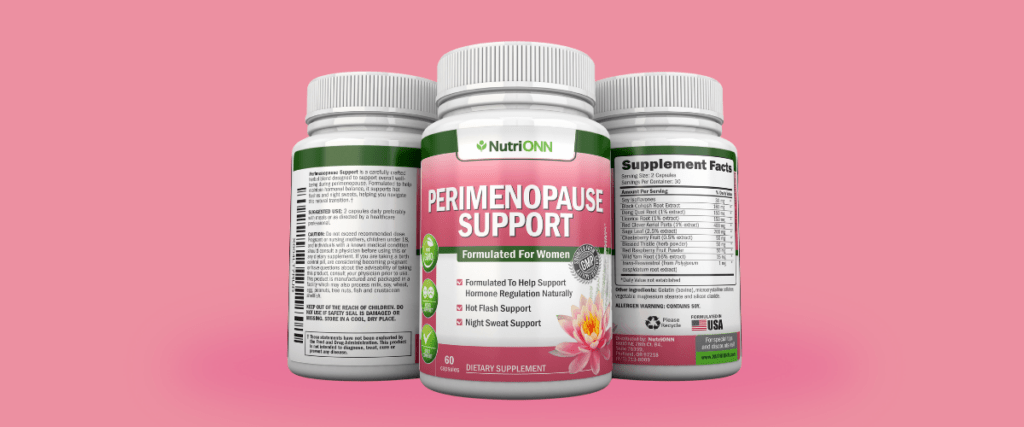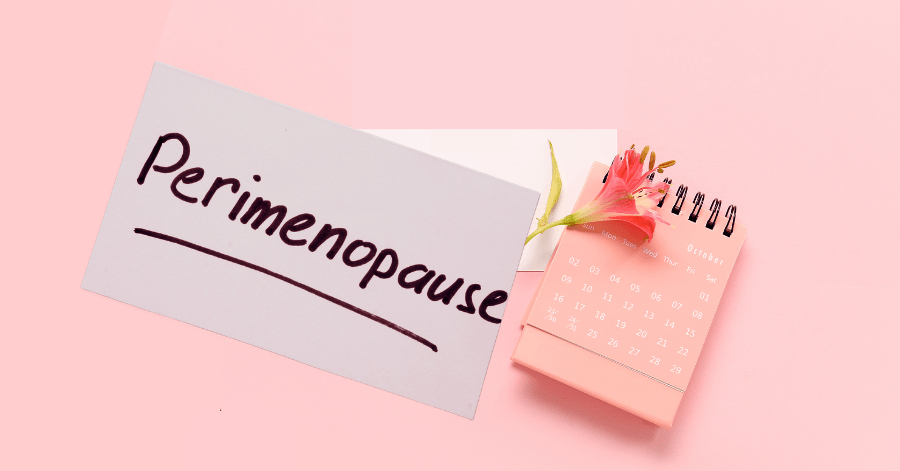Have you found yourself saying, “I just don’t feel like myself” lately? Perhaps you’re struggling with mood swings, hot flashes, disrupted sleep, or a general sense of physical and emotional imbalance? If this sounds familiar, it’s possible that you’re experiencing perimenopause. Understanding perimenopause and its symptoms is the first step toward embracing this natural transition and taking control of your well-being. Let’s get started!
What is Perimenopause?
Perimenopause is a natural phase in a woman’s life marking the transition toward menopause. It is primarily caused by the ovaries gradually producing less estrogen and progesterone – the hormones responsible for regulating the menstrual cycle. This signifies that your body is moving toward the end of your reproductive years. Although it’s a natural and normal progression, it comes with both physical and emotional symptoms and some of these symptoms can even disrupt your life or cause discomfort.
When Do Women Typically Begin To Experience Perimenopause?
Perimenopause typically begins for women in their 40s, but it can start as early as their mid-30s or as late as their early 50s. The timing of perimenopause can also be influenced by factors like genetics, lifestyle, and health conditions. On average, women experience perimenopause for about 4 to 8 years before reaching menopause, which is defined as the point when they’ve gone 12 months without a menstrual period.
How Can I Recognize If I’m Experiencing Perimenopause?

The tricky part is that many women don’t even realize they are in perimenopause, as the symptoms can be subtle, varied, and often mistaken for other issues. You may feel like you’re losing your sense of self, wondering if something is wrong, but not knowing exactly what that something is.
You may notice changes in your menstrual cycle, mood, energy levels, or even your skin and sleep patterns. While perimenopause is a natural stage of life, it can sometimes be challenging to navigate because many women aren’t prepared for what lies ahead.
The symptoms of perimenopause can vary greatly from woman to woman, but some of the most common ones include:
- Irregular Periods: Your menstrual cycle may become unpredictable. Periods might be heavier or lighter, or you might skip them altogether for a few months before they return.
- Hot Flashes and Night Sweats: Sudden feelings of intense heat, often accompanied by sweating, are a hallmark of perimenopause. These can occur during the day or night, leading to disturbed sleep.
- Mood Swings: Hormonal fluctuations can affect your mood, leading to feelings of irritability, sadness, or even anxiety and depression. Many women describe feeling like they are “on an emotional rollercoaster” during this time.
- Sleep Disturbances: Difficulty falling asleep or staying asleep is common. Night sweats can worsen this, as can anxiety or restlessness.
- Fatigue: You may feel more tired than usual, even after a full night’s sleep. This can be a result of disrupted sleep patterns, stress, or hormonal changes.
- Weight Gain or Changes in Body Composition: Hormonal shifts can contribute to changes in metabolism and fat distribution, which may lead to weight gain, particularly around the abdomen.
- Decreased Libido: Many women notice a decrease in sexual desire or changes in how they feel about intimacy during perimenopause.
- Memory and Concentration Issues: “Brain fog” is a term many women use to describe difficulty concentrating, forgetfulness, or feeling mentally foggy.
How to Navigate Perimenopause and Take Care of Yourself

The good news is that you don’t have to go through this transition alone or without support. There are many ways to help manage the symptoms of perimenopause and ease this natural process. Here are some tips to help you feel more like yourself again:
#1. Understand Your Body:
Education is key. Understanding that perimenopause is a natural phase of life can help you feel more empowered. Acknowledge that your symptoms are normal and part of the process. Being able to identify what’s happening to your body can provide relief and reduce anxiety.
#2. Focus on Healthy Lifestyle Choices:
- Eat a balanced diet: A diet rich in whole foods, including fruits, vegetables, whole grains, lean proteins, and healthy fats, can help regulate hormones and improve energy levels.
- Exercise regularly: Physical activity, especially strength training and cardio, can improve mood, boost energy, and help with weight management. Exercise also improves sleep and can alleviate some symptoms like hot flashes and anxiety.
- Stay hydrated: Drinking plenty of water throughout the day can help with symptoms like bloating, fatigue, and hot flashes.
#3. Manage Stress:
Since perimenopause can bring emotional ups and downs, stress management becomes even more crucial. Practicing mindfulness, meditation, yoga, or deep breathing exercises can help you stay centered. Engaging in activities that make you feel relaxed and calm—whether it’s reading, walking in nature, or journaling—can support your mental health during this time.
#4. Consider Supplements:
During perimenopause, supplements can play a key role in managing symptoms and supporting your body through this transition. Consider incorporating natural supplements into your routine to help balance hormones, reduce hot flashes, improve sleep, and support overall wellness.
#5. Get Enough Sleep:
Prioritize sleep hygiene by creating a calming bedtime routine. Limit screen time before bed, keep your bedroom cool and dark, and try using relaxation techniques to wind down. If night sweats are a problem, consider using moisture-wicking sheets and light, breathable pajamas.
#6. Talk to Other Women:
You’re not alone in this. Connecting with friends, family members, or support groups can help you feel understood and supported. Sharing your experiences with others who are going through the same thing can be incredibly validating.
How Do I Choose The Right Supplement?
With so many supplement options available, choosing the right one for perimenopause can feel overwhelming. But it doesn’t have to be complicated. The key is to look for supplements that contain well-researched ingredients, specifically designed to address the most common symptoms you may be experiencing, such as hot flashes, mood swings, fatigue, and hormonal imbalances.
Why Choose NutriONN Perimenopause Support?

Navigating perimenopause can be challenging, but with the right support, you can manage this transition with greater ease. NutriONN Perimenopause Support is carefully formulated to address the most common symptoms associated with perimenopause—such as hot flashes, mood swings, fatigue, and hormonal imbalance. By blending traditional herbs and botanicals, our supplement offers a natural and effective solution to help your body restore balance during this time of change.
How NutriONN Perimenopause Support Helps You:
- Hormonal Balance: A combination of Soy Isoflavones, Black Cohosh, and Dong Quai helps regulate fluctuating hormone levels, providing relief from hot flashes, night sweats, and mood swings. These herbs naturally mimic estrogen, offering a effective way to support hormonal harmony.
- Boost Energy & Reduce Fatigue – Red Raspberry Fruit Powder, Licorice Root, and Wild Yam Root are key ingredients that help combat fatigue, restore energy, and support overall vitality. These natural adaptogenic herbs help you feel energized and revitalized, supporting your overall well-being throughout the day.
- Promote Emotional Well-being – Chasteberry and Sage Leaf work together to balance mood and ease irritability. By regulating the hormonal cycle, these ingredients help reduce anxiety and improve emotional stability during hormonal transitions.
In addition to these key ingredients, NutriONN Perimenopause Support also includes a carefully selected blend of complementary herbs that work synergistically to enhance the supplement’s effects. Blessed Thistle promotes healthy liver function and detoxification, helping your body process hormones more efficiently. Wild Yam Root and Licorice Root help support adrenal health and reduce stress, which is essential as your body adjusts to hormonal shifts. Together, these ingredients offers you a natural perimenopause relief, helping you regain balance and vitality during this important transition.
Final Thoughts
Perimenopause is a natural stage of life, though it can feel overwhelming at times. By recognizing the symptoms, understanding that they’re part of a natural life transition, and taking steps to support yourself physically and emotionally, you can navigate this phase with greater confidence and ease. With the right tools and knowledge, you can emerge from it feeling empowered, healthy, and strong. You will find yourself again.



0 Comments